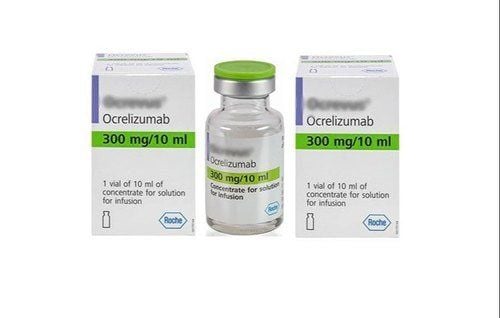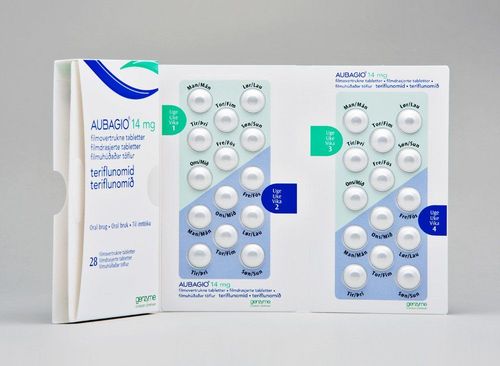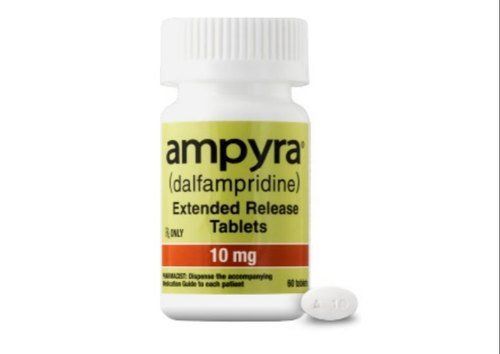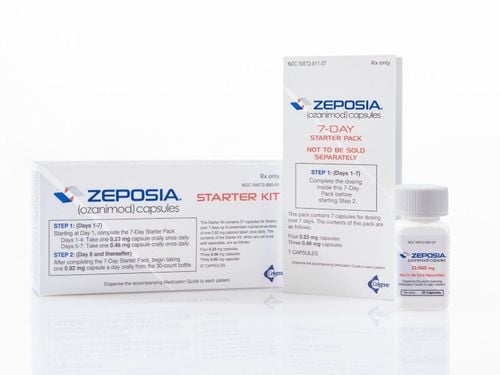This is an automatically translated article.
Fingolimod drug is prepared in capsule form, used orally. The drug is very effective in the treatment of multiple sclerosis. This is a disorder of the brain and spinal cord that impairs nerve function. In addition, it causes scarring on the outer coating of nerve cells. Fingolimod works by suppressing the body's immunity, thereby reducing or slowing the development of the disease.
1. Uses of the drug Fingolimod
This drug is used to treat multiple sclerosis -MS . It's not considered a cure for MS, but it's thought to stop the immune system's cells (white blood cells) from attacking the nerves in your brain and spinal cord. It helps reduce the number of exacerbations and may prevent or delay disability.
2. How to use Fingolimod Capsule
Read the medication instructions provided by your pharmacist before you start taking fingolimod and each time you get a refill. If you have any questions about this medication, talk to your doctor for the most accurate information.
Before starting fingolimod, your doctor will do medical or laboratory tests (such as complete blood count, blood pressure, electrocardiogram, pulse, eye exam) to monitor for side effects. It is taken by mouth and can be taken with food, usually once a day. You will be monitored for at least 6 hours after the first dose to make sure your heart rate is not too slow. A very slow heart rate increases your risk of serious heart rhythm problems (QT prolongation in the electrocardiogram). Tell your doctor if you have low levels of magnesium or potassium in your blood, a personal or family history of QT prolongation in your electrocardiogram, a family history of sudden cardiac death, or heart failure. Also tell your doctor if you are taking other medicines that can slow your heart rate or affect your heart rhythm (such as causing QT prolongation in an electrocardiogram).
A small number of people using this medicine have had their MS symptoms get much worse - or become permanently disabled - after stopping fingolimod. Therefore, do not stop using fingolimod without first talking to your doctor. If your doctor temporarily stops fingolimod, you may need to have your heart rate monitored again for at least 6 hours after you start this medicine again. Children with increased doses may also need to be monitored again in 6 hours.
Dosage depends on your age and weight. Do not increase the dose on your own or take it for longer than prescribed by your doctor. This will not help your condition increase, but may cause some harmful side effects to your health.
You should take the medicine at the right time and the right dose in the prescription to quickly recover the condition. The best way for you not to miss a dose, set a reminder to take your pill at the same time every day in your phone. In case your condition not only does not improve but also worsens, go to the hospital to get help from medical staff.

Thuốc Fingolimod cần được sử dụng đúng cách
3. Side effects when using Fingolimod
During the use of the drug you may have a cough, headache, back pain or diarrhea. If these symptoms persist or get worse, tell your doctor for immediate treatment.
The side effects of this medicine may be high blood pressure. That's why it's important to check your blood pressure regularly.
Fingolimod may increase the risk of skin cancer and lymphoma. Tell your doctor right away if you notice any new or changed moles or moles on your skin, or swollen lymph nodes.
This medicine may weaken your immune system or increase your risk of infection while you are taking it and for 2 months after your last dose. You are more likely to have a serious (possibly fatal) infection (such as bronchitis, pneumonia, herpes). Tell your doctor right away if you have any signs of an infection such as a persistent cough or sore throat, trouble breathing, fever or chills, cold or flu symptoms, sores or blisters. Do not start fingolimod if you already have an infection.
Fingolimod may increase your risk of a rare (possibly fatal) brain infection (progressive multifocal encephalopathy-PML). This can sometimes happen even after treatment has been stopped. Symptoms of PML can resemble a worse MS attack. Tell your doctor right away if you have any new or worse symptoms that last for several days, such as clumsiness or problems with strength, balance, speech, vision, or impaired vision. think.
Get medical help right away if you have any very serious side effects, including: trouble breathing, chest pain, severe dizziness or fainting, slow or irregular heartbeat or pounding or fast unusual tiredness or weakness, eye pain or sensitivity to light, vision changes (such as blurred vision, blind spots or shadows in the center of your vision, changes in color), changes in your mind psychosis (such as sudden confusion), seizures, sudden or severe headache.
Serious liver problems may occur such as: Nausea or vomiting that doesn't stop, loss of appetite, stomach or abdominal pain, yellowing of the eyes or skin, dark urine. However, these symptoms appear very rarely.
Some signs that you are having a serious allergic reaction include: rash, itching or redness, severe dizziness, difficulty breathing. If the patient shows these symptoms, take them to the nearest medical facility for timely treatment.

Khi sử dụng thuốc Fingolimod, người bệnh có thể gặp một số tác dụng phụ
4. Precautions
Before taking fingolimod, tell your doctor or pharmacist if you are allergic to it or if you have any other allergies. There are some inactive ingredients in the medicine, which can cause allergies or other problems that affect your health.
Before using this medicine, give a very detailed description of your medical history, especially: shortness of breath (such as asthma, bronchitis, emphysema, sleep apnea), current or returning infection recent or (including hepatitis and tuberculosis), diabetes, fainting, certain eye problems (macular edema, uveitis), heart problems (such as bradycardia or abnormality, heart failure, pre-myocardial infarction, chest pain, QT prolongation in electrocardiogram), high blood pressure, liver disease, stroke or "mini-stroke" or transient ischemic attack (TIA) ). This is very important in your treatment.
Perform all preventive vaccinations before starting this medicine. Do not take any vaccinations while taking fingolimod and for 2 months after your last dose without your doctor's consent. Also, avoid contact with people who have recently received an oral polio vaccine or inhaled flu vaccine and who have an infection that could spread to others (such as chickenpox, flu). Practice hand washing with soap to prevent the spread of bacteria.
The ingredients in the medicine can cause skin cancer. Therefore, when using Fingolimod, it is necessary to limit the time of exposure to the sun. Avoid tanning booths and sunlamps. In case you need to go outdoors, you should use sunscreen carefully and wear protective clothing and sunglasses. Even in severe cases, doctors recommend avoiding spotlights while you use this product.
Talk to your doctor about any medications you are taking (including prescription, over-the-counter and functional supplements). Women who are pregnant or intend to become pregnant are advised not to take the drug during this time. Because Fingolimod may harm your unborn baby. As a result, many women are asked to take a pregnancy test before being prescribed the pill. If you become pregnant, talk to your doctor right away about the risks and benefits of the drug. Because it is not known whether the ingredients of the drug pass into the breast milk or not, breastfeeding women should also limit the use of this drug.
5. Interaction
Drug interactions occur that can change the mechanism of action and increase the risk of serious side effects. Do not arbitrarily decide on the dose of any medicine without the consent of your doctor.
Some products that may interact with these drugs include: Ketoconazole, medicines that slow your heart rate (including digoxin, beta-blockers like atenolol or metoprolol, calcium channel blockers like diltiazem or verapamil), certain medications medicines for abnormal heart rhythms (including amiodarone, disopyramide, dofetilide, dronedarone, ibutilide, procainamide, quinidine, sotalol), other medicines that weaken the immune system or increase the risk of infection (such as natalizumab, rituximab).
Note:
Do not share this medicine with others. Laboratory and/or medical tests (such as complete blood count, blood pressure, pulse, electrocardiogram, MRI, eye exam, liver function test, lung or breathing test, checkup skin cancer, cervical smear) did not affect the treatment of the drug.
Missed dose
In case you miss a dose, take it as soon as you remember. However, if it is almost time for your next dose you should skip the missed dose and continue taking it. medication as usual. Don't double the dose to catch up. The best way to not miss a pill is to set a reminder to take your medicine in your phone every day.
Please dial HOTLINE for more information or register for an appointment HERE. Download MyVinmec app to make appointments faster and to manage your bookings easily.
Reference source: webmd.com












